CAMANO ISLAND — When Kalina Shouse’s husband died from cardiac arrest at their home on Camano Island last year, she was confused.
Erik Shouse, a Mill Creek paramedic and a Camano Island fire commissioner, was 40. He led an active life, and he didn’t have any personal or family history of heart complications. He passed his physicals. He didn’t smoke.
“He did not lead a sedentary life,” Kalina Shouse said.
But an autopsy report showed her husband had heart disease. After doing research, Kalina Shouse became convinced his condition was work-related.
Studies show that first responders experience unseen consequences from their work. Firefighters, in particular, are subject to irregular sleep patterns, loud noises that increase adrenaline, poor diets and smoke exposure. Moreover, the nature of their work frequently exposes them to tragic scenes, causing psychological stress that eventually could lead to post-traumatic stress disorder.
In a decision with profound implications for his widow, the Department of Labor and Industries agreed on May 30 that such stressors likely played a role in Erik Shouse’s death, determining that he died in the line of duty as a result of occupational disease.
The designation qualifies Kalina Shouse for survivor benefits, and gives an opportunity for her and other firefighters to honor her late husband at local and national memorials.
“It validated what I knew and what I felt in my heart, and what everyone around Erik knew, that this was a result of the long-term effects of being a firefighter,” Kalina Shouse said.
Erik Shouse’s lifelong career in firefighting began at the age of 18, when he saw a sign outside of a station in Edgewood, calling for volunteers.
“He always said he couldn’t imagine doing anything else,” Kalina Shouse said.
He soon enrolled at Central Washington University to become certified as a paramedic, and spent much of his career at Station 76 in Mill Creek, the busiest in Fire District 7.
There, he likely helped save hundreds of lives from stabbings, heart attacks and other medical emergencies. He became known for his cool head and sense of humor.
Kalina Shouse said her husband knew how to compartmentalize his work and his personal life. He rarely told her the bad stories, and instead focused on the calls in which he felt he made an impact.
There were no hints that he suffered a medical condition that would lead to his death in April 2018. But every firefighter faces the same dangers as Erik Shouse, studies suggest.
Through the Department of Labor and Industries, Washington offers firefighters and their families coverage for certain illnesses, such as cancer or post-traumatic disorders, no questions asked. The department presumes that firefighters face a substantial risk of suffering from those illnesses if they’re on the job long enough.
The law also outlines coverage for certain cardiac episodes, but there’s a timer attached. The state will cover any heart problems experienced within 24 hours of strenuous physical exertion related to firefighting activities, or within 72 hours of exposure to smoke, fumes or toxic substances.
Labor and Industries will consider other medical situations on a case-by-case basis. When Kalina Shouse and the local firefighters’ union brought their argument, department officials were swayed.
Ray Sayah, a representative of the Snohomish County firefighter union, thinks coverage for heart disease should be automatic, taking into account the cumulative stress of the job.
In fact, 32 other states already do so, in one form or another. Efforts are underway to make Washington No. 33.
Dennis Lawson, president of the Washington State Council of Fire Fighters, said the advocacy organization plans to look into how other states have addressed the issue, and how changes might be introduced in the Legislature.
“This is one that’s on our list,” Lawson said.
Democratic state Rep. John Lovick of Mill Creek — a former state trooper and sheriff — also has signaled support for new legislation. With a short session, however, he said he wasn’t sure if a bill would be ready in time for the coming year.
Kalina Shouse hopes a fix comes soon, so a clear path can be made for others who face similar situations. When her husband died, she was left alone to raise two girls as a working parent. If the state had classified right away that her husband died in the line of duty, she could have qualified much earlier for financial relief, including monthly payments and health care through the state.
“There will be other families in the future,” she said.
Zachariah Bryan: 425-339-3431; zbryan@heraldnet.com. Twitter: @zachariahtb.
Talk to us
> Give us your news tips.
> Send us a letter to the editor.
> More Herald contact information.



























